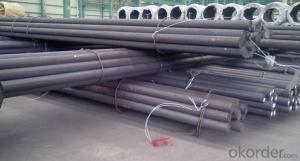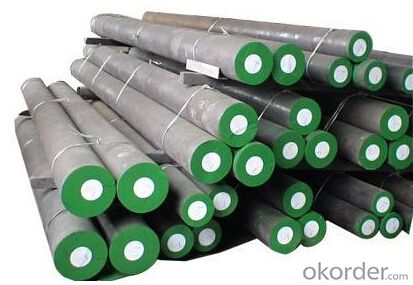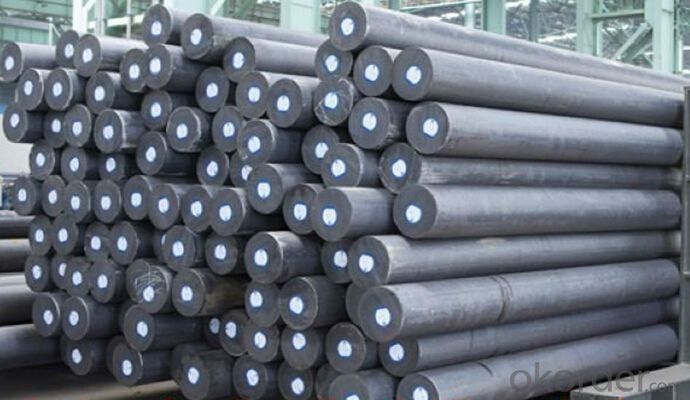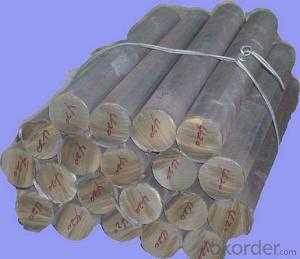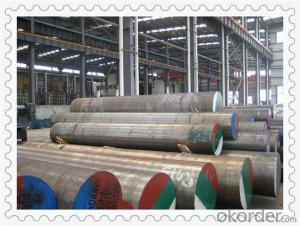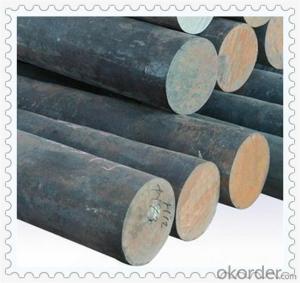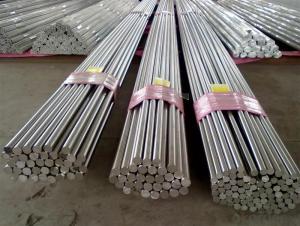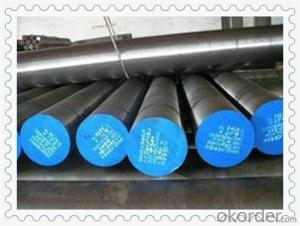Grade SAE1045 CNBM Carbon Steel Round Bar
- Loading Port:
- Shanghai
- Payment Terms:
- TT OR LC
- Min Order Qty:
- 3 m.t
- Supply Capability:
- 10000 m.t/month
OKorder Service Pledge
OKorder Financial Service
You Might Also Like
Specification
Specifications of Round Bar
Material | 1045 | Round bar | Dia(mm) | 16-300 |
Process | EAF + LF + VD + Forged + Heat Treatment (optional) | Length (mm) | Max 12000 | |
Heat treatment | Normalized / Annealed / Quenched / tempered | Flat bar | Thickness(mm) | 8-500 |
Delivery condition | Hot forged +Rough machined (black surface after Q/T)+ Turned (optional) | Width(mm) | 70-200 | |
Test | Ultrasonic test according to SEP 1921-84 D/d | Length (mm) | Max 12000 | |
Chemical Compostion
C | Si | Mn | S | P | Cr | Ni | Mo |
0.42~0.50 | ≤0.40 | 0.50~0.80 | ≤0.045 | ≤0.045 | ≤0.40 | ≤0.40 | ≤0.10 |
Our Featured Products
Alloy steel / Bearing steel// Spring steel/ Cr- mo steel
GB 20Cr/ 40Cr / 42CrMo / 35CrMo/ 20CrMn/GCr15/30CrMnTi…
ASTM 5120 /5140 / 4140/ 4135/ 5152/52100…
JIS SCr420H/ SCr440/ SCM3/ SUP9/SUJ2…
Carbon steel: Carbon tool steel /Carbon Structural Steel
GB 20/ 35 /45/…
ASTM 1020/ 1030/1045…
JIS S20C/ S30C / S45C…
Usage and Applications of Round Bar
1. Chinese standard steel bar is often used where large amounts of steel need to be formed, for example as structural steel.
2. And we can use this kind of product on the performance of the mechanical parts if the demand is not very high.
3. Steel round bar is used in construction and a large number of architectural and engineering structures.
Packaging & Delivery of Round Bar
Packaging Detail: All goods are packed in bundle with steel strips and shipped by break bulk vessel or container (depend on target market and different ports)
Delivery Detail: 15~45 days
Trade terms: FOB, CFR, CIF
Weight: Theprice invoicing on theoretical weight basis or actual weight basis depends on customer’s request.
Shipment: The shipment of bulk break or container is depends on customer’s request and the situation of the port of destination.
Documents given: Full set of original clean on board bill of lading; Original signed commercial invoice; Original packing list; Policy of insurance; Certificate of origin and what the target market needs.
FAQ:
Q1: Why buy Materials & Equipment from OKorder.com?
A1: All products offered byOKorder.com are carefully selected from China's most reliable manufacturing enterprises. Through its ISO certifications, OKorder.com adheres to the highest standards and a commitment to supply chain safety and customer satisfaction.
Q2: How do we guarantee the quality of our products?
A2: We have established an advanced quality management system which conducts strict quality tests at every step, from raw materials to the final product. At the same time, we provide extensive follow-up service assurances as required.
Q3: How soon can we receive the product after purchase?
A3: Within three days of placing an order, we will begin production. The specific shipping date is dependent upon international and government factors, but is typically 7 to 10 workdays.
Q4: What makes stainless steel stainless?
A4: Stainless steel must contain at least 10.5 % chromium. It is this element that reacts with the oxygen in the air to form a complex chrome-oxide surface layer that is invisible but strong enough to prevent further oxygen from "staining" (rusting) the surface. Higher levels of chromium and the addition of other alloying elements such as nickel and molybdenum enhance this surface layer and improve the corrosion resistance of the stainless material.
Q5: Can stainless steel rust?
A5: Stainless does not "rust" as you think of regular steel rusting with a red oxide on the surface that flakes off. If you see red rust it is probably due to some iron particles that have contaminated the surface of the stainless steel and it is these iron particles that are rusting. Look at the source of the rusting and see if you can remove it from the surface.
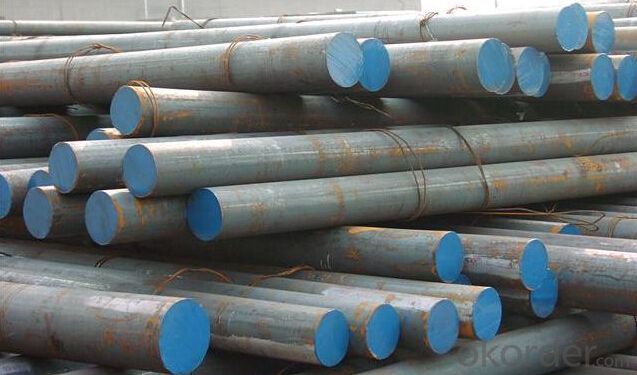
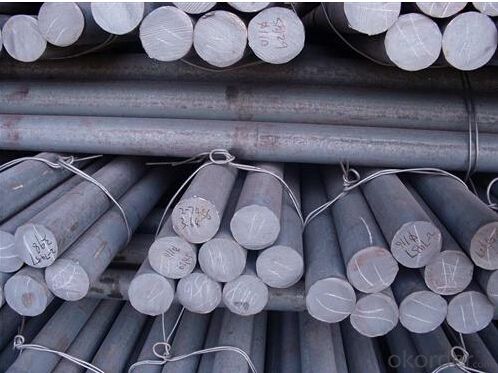
- Q: How does the composition of special steel affect its mechanical properties?
- The mechanical properties of special steel are significantly influenced by its composition. Special steel refers to a type of steel that has been altered or mixed with other elements to enhance its strength, toughness, hardness, and other desirable properties. The mechanical properties of special steel can be greatly affected by the addition of various alloying elements, such as manganese, chromium, nickel, molybdenum, vanadium, and tungsten. For instance, the inclusion of chromium can enhance corrosion resistance and hardness, making the steel more suitable for use in harsh environments. Manganese is often added to improve the steel's hardenability and tensile strength. Nickel can increase toughness and strength while maintaining good ductility. The specific mechanical properties of special steel can be achieved by adjusting the amount and combination of these alloying elements. For example, increasing the carbon content can boost the steel's strength and hardness, but it may reduce its ductility. Conversely, reducing the carbon content and introducing elements like nickel and molybdenum can enhance the steel's toughness and resistance to impacts. Moreover, the heat treatment process is crucial in influencing the mechanical properties of special steel. Techniques like quenching and tempering allow for the manipulation of the steel's microstructure to attain desired properties. Quenching involves rapidly cooling the steel to achieve high hardness and strength, while tempering helps reduce brittleness and improve toughness. In conclusion, the mechanical properties of special steel are determined by its composition, including the type and quantity of alloying elements, as well as the heat treatment process. By carefully selecting and controlling these factors, manufacturers can customize special steel to meet specific performance requirements for a wide range of applications.
- Q: What are the different automotive grades of special steel?
- In the automotive industry, various grades of special steel are utilized. Specifically tailored to meet the unique requirements of this sector, these grades offer a wide array of options. Some commonly employed grades encompass: 1. Advanced High-Strength Steels (AHSS): Renowned for their exceptional strength and remarkable formability, AHSS is employed in critical automotive components such as chassis, body panels, and safety systems. This utilization enhances crash performance while simultaneously reducing weight. 2. Dual-Phase Steels (DP): DP steels, a subcategory of AHSS, provide a combination of high strength and good ductility. They find common use in automotive applications necessitating both strength and formability, such as structural components and reinforcements. 3. Martensitic Steels: Distinguished by their high strength and hardness, martensitic steels are frequently utilized in automotive applications requiring resistance to wear and impact. Examples include crankshafts, gears, and axles. 4. Transformation-Induced Plasticity (TRIP) Steels: TRIP steels are designed to offer high strength, excellent formability, and superior energy absorption during impacts. They find application in automotive safety components like bumper reinforcements and crash boxes. 5. High-Strength Low-Alloy (HSLA) Steels: HSLA steels strike a balance between strength, formability, and cost-effectiveness. They are commonly employed in automotive structural components and suspension systems, aiding in weight reduction while maintaining structural integrity. 6. Stainless Steels: Exhibiting corrosion resistance, stainless steels are ideal for automotive applications that necessitate protection against rust and corrosion. This includes exhaust systems, fuel tanks, and decorative trims. The diverse range of special steel grades empowers automotive manufacturers with ample choices to cater to specific needs in terms of strength, formability, durability, and corrosion resistance. The selection of the appropriate grade hinges on the intended application and desired performance characteristics.
- Q: How is special steel used in the production of conveyor belts?
- Special steel is used in the production of conveyor belts primarily for their strength and durability. It is commonly used in the construction of belt pulleys and rollers, which are essential components of conveyor systems. The special steel used in these parts ensures that they can withstand heavy loads, resist wear and tear, and maintain their shape and functionality over long periods of use.
- Q: What are the challenges in welding special steel?
- One of the main challenges in welding special steel is its high carbon content, which can lead to increased difficulty in achieving proper fusion and producing a sound weld. Additionally, special steels often have alloying elements that can affect their weldability, such as increased susceptibility to cracking or reduced ductility. Another challenge is the potential for distortion or warping during the welding process due to the high heat input required. Overall, welding special steel requires careful consideration of the material's composition and properties to ensure successful and reliable welds.
- Q: How is special steel used in the production of pressure vessels?
- Special steel is employed in the manufacturing of pressure vessels because of its distinctive characteristics that make it suitable for enduring high-pressure environments. Pressure vessels, which are containers designed to hold gases or liquids at a significantly different pressure than the surrounding atmosphere, frequently find application in industries such as oil and gas, chemical, and power generation. To guarantee the safety and dependability of these containers, the use of special steel in pressure vessel production is essential. Special steels, including carbon steels, stainless steels, and alloy steels, provide improved mechanical properties, high strength, and exceptional resistance to corrosion. These attributes are crucial for withstanding the extreme pressure conditions experienced by pressure vessels. One of the primary roles of special steel in pressure vessel production is to provide resistance against internal pressure. The steel must possess the ability to endure the force exerted by the vessel's contents without deforming or rupturing. Due to the high strength and toughness of special steels, they are capable of handling these pressures, thereby ensuring the vessel's integrity and preventing catastrophic failures. Additionally, special steel plays a vital role in preserving the structural integrity of pressure vessels. These vessels encounter various external loads, such as wind, seismic forces, and thermal expansion. The superior mechanical properties of special steel enable it to withstand these loads without significant deformation or failure, thereby ensuring the structural stability of the pressure vessel. Moreover, special steel's resistance to corrosion is crucial in pressure vessel production. Pressure vessels frequently contain corrosive substances, and the corrosive environment can lead to material degradation over time. Special steels, particularly stainless steels, offer excellent corrosion resistance, thus minimizing the risk of material deterioration and prolonging the vessel's lifespan. In conclusion, special steel is used in the production of pressure vessels due to its high strength, toughness, and corrosion resistance. These properties enable the steel to endure high-pressure conditions, maintain structural integrity, and prevent failures related to corrosion. By utilizing special steel, manufacturers of pressure vessels can ensure the safety, dependability, and longevity of these critical containers.
- Q: Can special steel be used in food processing applications?
- Yes, special steel can be used in food processing applications. Special steel, such as stainless steel, is commonly used in the food industry due to its excellent corrosion resistance, hygienic properties, and durability. It is safe for food contact, easy to clean, and does not react with acidic or alkaline substances.
- Q: What are the main applications of special steel in the food packaging industry?
- Special steel is widely used in the food packaging industry due to its unique properties and benefits. It is primarily used for manufacturing various components of food packaging machinery, such as cutting blades, molds, and dies. The main applications of special steel in this industry include ensuring precision cutting, shaping, and forming of packaging materials, enhancing durability and resistance to wear and tear, and maintaining hygiene standards by preventing contamination and facilitating easy cleaning.
- Q: How does special steel perform in tooling applications?
- Special steel performs exceptionally well in tooling applications due to its high strength, durability, and resistance to wear and abrasion. It is specifically designed to withstand the demanding conditions of tooling environments, such as cutting, shaping, and forming various materials. The unique properties of special steel, including its excellent hardness and toughness, make it an ideal choice for producing reliable and long-lasting tools that can efficiently handle heavy workloads and maintain their performance over time.
- Q: What are the requirements for special steel used in metalworking tools?
- The requirements for special steel used in metalworking tools include high hardness, excellent wear resistance, good toughness, and high heat resistance. Additionally, the steel should have good machinability, be able to hold a sharp edge, and have the ability to withstand high temperatures and loads without deforming or breaking.
- Q: What are the future trends and innovations expected in special steel production?
- The special steel production industry is anticipated to undergo significant changes in the future. Several trends and innovations will shape this industry, and the following key areas are expected to see advancements: 1. Advanced Manufacturing Techniques: Special steel manufacturers will likely adopt advanced manufacturing techniques, such as additive manufacturing (3D printing) and digitalization. These technologies will facilitate the production of complex geometries, minimize waste, and allow for customization of special steel products. 2. Sustainable Production: Due to growing environmental concerns, there will be a focus on sustainable production methods in the special steel industry. This will involve adopting energy-efficient processes, recycling and reusing materials, and reducing the carbon footprint of steel production. 3. High-Strength and Lightweight Alloys: The demand for lightweight materials in sectors like automotive and aerospace will drive special steel production towards developing high-strength and lightweight alloys. These alloys will enhance performance while reducing component weight, leading to improved fuel efficiency and sustainability. 4. Nanotechnology and Microstructural Engineering: Nanotechnology and microstructural engineering will enhance the properties of special steels. By manipulating materials at the nanoscale, manufacturers can improve strength, toughness, corrosion resistance, and other characteristics. 5. Enhanced Surface Treatments: Advancements in surface treatments, such as coatings, will improve the performance and longevity of special steel products. Innovative surface treatments will offer increased resistance to wear, corrosion, and heat, expanding the range of applications for special steels. 6. Digitalization and Data Analytics: Special steel production will undergo a revolution with the integration of digital technologies and data analytics. Smart factories with interconnected systems will enable real-time monitoring, predictive maintenance, and improved quality control, resulting in higher productivity and efficiency. 7. Automation and Robotics: Automation and robotics will continue to play a vital role in special steel production, optimizing productivity, reducing human errors, and improving worker safety. This will enhance overall operational efficiency. 8. Industry 4.0 Integration: The special steel industry will embrace Industry 4.0 principles, including the Internet of Things (IoT) and artificial intelligence (AI). These technologies will enable seamless connectivity, intelligent decision-making, and predictive analysis, leading to improved productivity, cost-effectiveness, and competitiveness. In conclusion, the future of special steel production will be shaped by advancements in manufacturing techniques, sustainable practices, material engineering, digitalization, and automation. These innovations will not only enhance the performance and quality of special steel products but also contribute to a more sustainable and efficient industry.
Send your message to us
Grade SAE1045 CNBM Carbon Steel Round Bar
- Loading Port:
- Shanghai
- Payment Terms:
- TT OR LC
- Min Order Qty:
- 3 m.t
- Supply Capability:
- 10000 m.t/month
OKorder Service Pledge
OKorder Financial Service
Similar products
Hot products
Hot Searches
Related keywords
